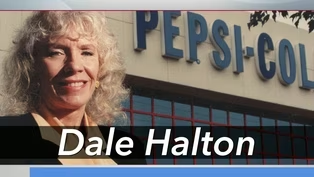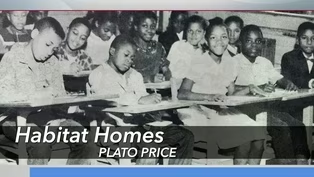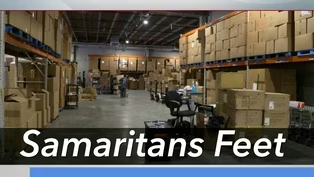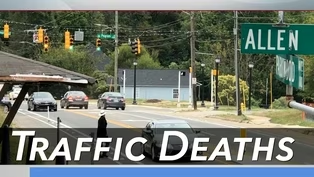
Carolina Impact: November 2, 2021
Season 9 Episode 8 | 27m 16sVideo has Closed Captions
Traffic deaths, Plato Price - Habitat homes, Samaritans Feet warehouse tour, Dale Halton
Charlotte City Leaders explore changing the streets to help slow down traffic, the site of the historic old Plato Price high school becomes home to new affordable housing and the non-profit Samaritans Feet opens a new 80,000 square foot headquarters to create more impact with shoes for those in need.
Problems playing video? | Closed Captioning Feedback
Problems playing video? | Closed Captioning Feedback
Carolina Impact is a local public television program presented by PBS Charlotte

Carolina Impact: November 2, 2021
Season 9 Episode 8 | 27m 16sVideo has Closed Captions
Charlotte City Leaders explore changing the streets to help slow down traffic, the site of the historic old Plato Price high school becomes home to new affordable housing and the non-profit Samaritans Feet opens a new 80,000 square foot headquarters to create more impact with shoes for those in need.
Problems playing video? | Closed Captioning Feedback
How to Watch Carolina Impact
Carolina Impact is available to stream on pbs.org and the free PBS App, available on iPhone, Apple TV, Android TV, Android smartphones, Amazon Fire TV, Amazon Fire Tablet, Roku, Samsung Smart TV, and Vizio.

Introducing PBS Charlotte Passport
Now you can stream more of your favorite PBS shows including Masterpiece, NOVA, Nature, Great British Baking Show and many more — online and in the PBS Video app.Providing Support for PBS.org
Learn Moreabout PBS online sponsorship- [Announcer] This is a production of PBS Charlotte.
- Just ahead on "Carolina Impact."
- On Charlotte's most dangerous streets, speeders are the most dangerous drivers.
I'm Jeff Sonier, stick around.
We'll show you how on some streets, fewer lanes are forcing those fast drivers to slow down.
- Plus, the site of a historic Black high school becomes home to new affordable housing units.
Travel down memory lane with the Plato Price graduates who overcame difficult odds.
And, he grew up without shoes.
Now he's on a mission to distribute 10 million shoes worldwide.
We're taking you inside the new Samaritan's Feet international headquarters.
"Carolina Impact" starts right now.
(dynamic music) - [Announcer] "Carolina Impact," covering the issues, people, and places that impact you.
This is "Carolina Impact."
- Good evening, thanks so much for joining us.
I'm Amy Burkett.
Here in Charlotte, our big hurry up city has a big hurry up problem.
Hurry up drivers.
Police say, speeding is the number one cause of fatal car crashes in the city.
But you can't put a cop on every street.
So, maybe changing the street itself can help slow down traffic and save lives.
Carolina Impact's Jeff Sonier is on one of those dangerous streets where the city is trying something very new.
- Yeah, this busy stretch of Parkwood Avenue between the Plaza and Davidson used to be two lanes in each direction.
Now it's just one lane in each direction.
It's what the city calls a road diet, slimming down a street with fewer lanes for the same amount of traffic.
But why would the DOT do that?
Creating a traffic jam where there wasn't a traffic jam before?
- Because people drove up and down it like idiots.
And at 20 plus miles an hour over the speed limit.
- [Jeff] That's city council member Larken Egleston, during a discussion of Charlotte's Vision Zero program, as in zero traffic deaths.
Explaining to the rest of council, what neighbors on Parkwood already know.
- There are plenty of people driving 10 miles an hour above the speed limit around Charlotte.
And I wish they wouldn't, but that's not the problem.
The problem is we have people that drive like complete morons.
- [All] Three, two, one.
(group clapping) - [Jeff] A few days later, Egleston was among those out here on Parkwood for the rainy day ribbon cutting, on a project that adds new lanes for bike riders, but takes away lanes for speeding drivers.
- Obviously, the changes made to this street will make it significantly less likely that people walking and riding bikes will hit by a driver.
But the design will also reduce speeding.
- [Jeff] The new two lane instead of four lane design on Parkwood's hills and curves forces those speeders to slow down on a stretch of road where people have died because of speeding drivers.
- So today again, we're celebrating a safer street that we will expect a drop, dramatically reduce the number of serious injuries and fatalities.
- [Jeff] The Parkwood project also connects to a similar safe street project on the Plaza, where the signs say 30 miles an hour, but what really keeps the speed limit down is this long line of planters, pavement markings, and plastic barricades.
Narrowing the Plaza to one lane in each direction.
It's a lot safer for the Plaza's pedalers and pedestrians because lead foot drivers wind up hitting the brakes instead of hitting them.
- What we hope is that the drivers will slow down.
And we have safer streets.
- [Jeff] Police major, Dave Johnson, is showing city council this map of Charlotte's high injury network.
30 Vision Zero streets where CMPD's transportation unit wrote almost 4,300 tickets during the first 10 months of 2021.
But it's been two years, $2 million spent, and too little progress, say some council members.
Since our last report on the Vision Zero program in 2019.
- [Reporter] Back here at home, friends and loved ones stopping by Myers Park today to honor a bicyclist who was hit and killed.
- [Jeff] The breaking news stories on TV.
- Seems one person is dead after a crash on Mount Holly Road.
- [Jeff] The few seconds of accident scene video that all looks sort of the same, until it happens to you.
- And I'm rushing over there, and I'm listening to the radio, and I hear a fatality on Mount Holly Road.
And I was like, why didn't he just tell me so I wouldn't be driving so hard?
- When I saw that there was an is accident around the corner with a fatality of a motorcycle, I screenshot it before I left home.
- I noticed my cell phone was exploding with texts from people asking me if I'd heard from Stacy.
And, that's Stacy.
This was about four months or so before she died.
- [Jeff] And for family members of Charlotte accident victims, their loss lingers long after the crash itself.
(somber music) - [Dave] In 2020, for comparison purposes, our major crash unit investigated 81 fatalities.
And unfortunately, we're on track to probably meet or exceed that number this year.
- [Jeff] Those rising traffic fatality numbers are not what the city council members wanna hear.
- So we can't point to any improvement yet as a result of the things that we've done so far.
- I don't think anything's gonna change, I guess that's what I'm hearing.
But I think it's one of the biggest problems we have in our city because people know they're not gonna be stopped.
- I do think we need to see more enforcement on particularly high speed.
(engines revving) - [Jeff] Police meanwhile, say they are making progress in some areas, like nighttime street racing.
- We share your concern, certainly with excessive speeding.
You're all aware of the work that we've done this year to address drag racing and reckless driving.
Where multiple cars are lining up and racing a quarter mile through a parking lot, or down the street.
- This is a really important issue in terms of safety.
I mean, we have seen so many lives that have been lost because of the speeding, so many injuries.
I mean, we got to get a handle on the speeding on our streets.
- [Jeff] But one council member, Braxton Winston, actually favors police writing fewer speeding tickets, after getting one himself.
- Last week, I actually got a speeding ticket on one of those high injury networks.
You're not going to make that street safer by giving people speeding tickets for 54 miles per hour in a 35, because the infrastructure is what is dangerous.
- So we are implementing those sorts of changes.
I think we need to do more of it and we need to do it as quickly as possible.
But after a couple of those tickets, when your insurance starts to go up, that's what changes your behavior.
- And while the Vision Zero program continues to work on both enforcement and infrastructure, trying to slow speeding drivers down, and trying to make these dangerous streets safer.
While they also take one day a year, every November, to make sure those stories of loss aren't lost.
To remind everybody that every time a life is lost in a traffic accident, it affects lots of other lives.
The friends and the family members that those traffic accident victims leave behind.
Amy.
- Thanks so much, Jeff.
You can find out more about Charlotte's Vision Zero program on our website, pbscharlotte.org.
We'll link you to the city's interactive maps that show Charlotte's most dangerous streets, and where police are out looking for speeders and other dangerous drivers.
Well, a new 39 home development project is underway at the site of the former Plato Price School in West Charlotte.
The all-Black school was shut down in the '60s during desegregation.
The property was donated to Habitat by the city of Charlotte in 2018, to create affordable housing.
Carolina Impact's Bea Thompson sat down with several Plato graduates to revisit the memories stirred up by the intersection of new housing opportunities and politics, as well as Black history.
(gentle music) - There was a spirit there.
It existed because we were a small community.
- What they wanted was for each generation that came after them to be better.
- You had that inside feeling that you are the person that's going to make a tomorrow.
- Plato Price gave us the foundation to do anything we wanted to do.
- [Bea] A surgeon, a Congressman, an acclaimed artists, and a judge, a sample of the legacy of a poor, segregated African-American school in Mecklenburg County.
It was called Plato Price.
And from 1915, till 1966, it provided an education to African-American children from the first to the 12th grade, who all lived in rural areas of Southwest Mecklenburg County.
Yet for the students who attended, it was much more, even when they had much less.
- We knew that we didn't have much at the school.
We were probably the poorest school in the county.
'Cause if you look at our biology labs, science labs, math labs, we had nothing, we had no equipment.
- [Bea] But what they did have were educators who pushed the students to be involved in any and every opportunity, even when they had no facilities or equipment.
- If they found out you had any skill at anything, you were gonna have to do that.
And they were going to try you out at everything, to expose you to every opportunity that the school had available to offer to you.
- Coming from the county, real county, where the toilets were outside, and going to Plato Price, and having stalls to go to the bathroom inside was a big thing for us.
- [Bea] Ashford grew up drawing bees and bunnies on a farm with parents who were born in the 1800s, and thrived on the education she received.
- Teachers who could teach English, could teach French, could teach sometimes even home economics.
Those people were the statues in my eyes, as ladies.
♪ I done bad ♪ I'm going back to school - [Bea] At Plato Price, students had to be active and involved, from the glee clubs, to tap dancers and majorettes, 4H and future farmer's clubs, the band, home economics, to auto mechanics and driver's ed.
And many of them joined the school's pride and joy, its drill team, called The Dotties.
- [All] Double to the rear, by the left flank, right flank.
Pause to the rear by the squad, smooth.
- Then y'all used to say, oop.
- And we looked good doing that.
- [Bea] That team took the Cherry Blossom Festival national title two years in a row.
One of four Black schools in the county, Plato Price students had no gym for sports, and no uniforms for the band, or very many instruments that even worked.
(dynamic music) Yet the parents attended PTA, expecting teachers and the school to guide their children forward.
- Whatever good things you did were done in conjunction with the parents.
And whatever bad things you did, and discipline you deserved, were dispensed in the school and at home.
- Miss Powell, who was one of the teachers there, was in my neighborhood.
And Miss Powell was an honorable person.
I think she was the first woman to go to Johnson C. Smith.
- [Bea] And it was those teachers who made an impact that charted the life paths for many.
- They convinced me that the things that I was doing would not benefit me.
And that school was to prepare me for my life.
- My science teacher, Miss Garrison, is the person who planted in my head, for the very first time, the notion of that I could be a lawyer.
- The final graduating class was in 1961.
Then the first through 12th grade Plato Price was split up.
It eventually became a junior high school, closing in 1966.
But its legacy will live on in more than just the memories of its students.
The land that provided a space for education for so many will now provide the space to shelter many more.
(upbeat music) Habitat for Humanity will build close to 40 affordable homes on the nine acres of land.
- The neighborhood will be called The Meadows at Plato Price.
And that was intentionally designed to pay homage to the school and to the history there.
- [Bea] That history includes the future cardiac surgeon who had no science equipment, but would become chairman of surgery in New York state.
- That's me on the basketball team.
- [Bea] The kid who always questioned the teacher, well, he became a lawyer and a Congressman.
And that little girl, who's formerly enslaved grandparents helped to raise her, she became a nationally recognized folk artist with murals in airports.
- That's me in the middle here.
- [Bea] And that kid who changed his attitude?
Well, now he presides as a superior court judge.
And what do they see for the next generation of young people?
- If they appreciate their history, they could dream big, and realize those dreams.
- [Bea] Sometimes, it takes a look back to chart a course for the future.
For "Carolina Impact," I'm Bea Thompson.
- Thanks so much Bea.
Habitat officials say the new construction site is in an underserved corridor of Charlotte, where the average rate of home ownership is just 26%, compared to 57% for the rest of the county.
Habitat officials say they're committed to removing barriers to home ownership.
Well, did you know, shoes are one of the top five requested donations for students in the US?
The lack of shoes across the globe leads to foot-borne diseases and infection.
Since 2003, Charlotte-based Samaritan's Feet has distributed over 8 million shoes locally and abroad.
A new 80,000 square foot building in Charlotte is helping the organization expand.
Carolina Impact's Sarah Colon-Harris gives us a sneak peek of the new international headquarters.
And Shoezeum.
(energetic music) - [Sarah] Their joy is undeniable.
Children getting their feet washed by volunteers before receiving a new pair of shoes.
A gesture designed to promote humility.
The extra touch needed to make a connection.
- So this is the Shoezeum.
- [Sarah] For Manny Ohonme, service is the solution to a problem he's passionate about.
- This is actually our immersive space that tells a story of the different diseases that we tend to serve.
I mean, people don't realize that over a billion people in the world are infected with diseases.
- [Sarah] Growing up poor in Nigeria, Manny never imagined he'd one day become the CEO of an international nonprofit.
Co-founded in 2003 with his wife, Tracy, Samaritan's Feet distributes shoes to those in need, locally and abroad.
It all started in the couple's garage.
- In the early days, our warehouse used to be our garage at our home.
I still remember the first ever shoe drive we did was done with a elementary school called Hornets Nest Elementary School in Charlotte.
Raising over 800 pairs of shoes.
- [Sarah] Living on just $1 and one meal a day, Manny never owned a pair of shoes until he was nine.
He won them in a basketball competition put on by local missionaries.
- Every kid wanna get picked.
We were screaming, pick me, pick me, pick me.
Well I was one of the few that got picked that day.
Never played basketball in my life.
I thoroughly believe the angels was working overtime, because the shot I took went in.
I ended up winning the competition, becoming the first person, not just in my family, but in my entire community, to own a pair of tennis shoes.
It changed my life.
- The shoes transformed Manny's future.
At age 17, he left Africa for North Dakota on a basketball scholarship.
There, he met his wife.
The two would eventually join forces for a global mission to distribute shoes worldwide.
Their new headquarters, quadruple the size of the previous one.
What are some of the biggest challenges that you faced with the distribution?
- Well, logistics.
I think we have to be able to secure capacity to ship the shoes overseas, and it takes money.
So we have to have the funds to be able to pay for the shipping, pay for the containers, pay for our staff, and then get volunteers.
If we can get, before we used to get about 15,000 volunteers every year, our hope is we can quadruple that in the next year.
(upbeat music) - The new 80,000 square foot space not only houses shoes, but will also serve as an exhibit to create an immersive experience for visitors.
Manny, this exhibit is based off of an actual person's real life.
- Absolutely.
This is a story of a lady called Prossy in Uganda, that has five amazing children, just like you and I have dreams for those kids.
But her reality is different from our reality.
She live on less than $2 a day.
- [Sarah] The exhibit is a replica of Prossy's life abroad.
Her family's life has since been completely transformed through the generosity of donors, and shoes.
- We talk about it at Samaritan's Feet, it offers the opportunity for a child to be a child, to run about, to play, and to get excited.
Oftentimes, there's bottles, there's rocks, there's thorns.
There's all these elements that the child faces, and/or the adults face in their work.
And if they become injured, then infection can quickly set in.
- [Sarah] To combat diseases, Samaritan's Feet designed a special prophylactic shoe.
As the organization's digital marketing manager, Bryan Boan, travels abroad, often capturing stories of both trials and hope.
In Uganda, he met Amussa, a fishermen and married father of four.
- The father had a pair of old tires that was, had been holes poked in and laced up.
And that's what he wore on the bottom of his feet for somewhat of protection.
But he talked about how he had never owned an actual pair of shoes.
And he was in his late 40s.
- [Sarah] Back here in the US, Samaritan's Feet serves over 100,000 people a year.
Partnering with schools to provide inventory, making shoes more accessible for school leaders to discreetly serve students in need.
So this is where you house all of the shoes that are purchased?
- Yes.
So our warehouse, these ones are donated.
These are a lot of international shoes, that EVA toggle shoes, slides, Crocs, different types of style.
So our volunteers come in and process this.
- [Sarah] The shoes are sorted by size.
About 15,000 shoes are packed into each box to be distributed by partners, locally and overseas.
- Kids are picked upon, they're bullied for what they have.
So you begin to level the playing field and provide an opportunity for them to have a better education and a better experience in the classroom.
- [Sarah] Manny says he never forgot that serendipitous moment that changed the trajectory of his life.
Advice from the missionary, a good Samaritan who gave him his first pair of shoes.
- And right before I took off, he grabbed me by my shoulder.
And he looked at me, he says, son, just because all you see around you is poverty doesn't mean the God of the universe has forgotten about you.
He says, son, keep dreaming, and keep dreaming big.
- [Sarah] And dream he did.
- But I didn't realize that my pain and my misery that was in lack of footwear would become my life mission.
- [Sarah] Now, with a new headquarters, Manny has made it the organization's mission to serve 10 million people by 2022.
A dream that once seemed impossible, now well on its way to becoming a reality.
For "Carolina Impact," I'm Sarah Colon-Harris reporting.
- Thank you, Sarah.
You can find out how to connect with Samaritan's Feet on our website.
Well, did you know the taste of Pepsi Cola was born in the Carolinas?
You may not know the role a Charlotte entrepreneur's family played in the history of this fizzy drink.
The oldest Pepsi bottling franchise in the country started right here in Charlotte.
Carolina Impact's Jason Terzis shares the company's history, and its foundation of philanthropy.
- [Jason] Twice a month, you'll find a Dale Halton right here at Myers Park Country Club, cards in hand, playing bridge.
- You're not bringing more diamonds over there, are you?
- [Jason] It's a friendly game amongst friends.
- You've got an eight.
- No I don't.
- [Jason] Dale is just as comfortable dealing cards as she once was making million dollar deals as CEO and president of the Pepsi Cola Bottling Company of Charlotte.
The company started by her late grandparents, Henry and Sadie Fowler.
(jaunty music) The couple married in 1903, at a time when Charlotte's population was around 20,000.
- My grandmother was called in those days a grande dame.
That I'll never be.
And that's okay.
And she didn't show her heart.
My grandfather did.
And he was a good, good man.
My grandfather grew up on the family farm, north of Salisbury.
He came to Charlotte as a bookkeeper for Adams Grain and Feed.
- [Jason] Fowler excelled at his job and quickly advanced, but it was a side job that changed the couple's direction.
- He also did some nighttime bookkeeping for Mr. Snyder, who had the Coca-Cola franchise.
And he knew that there was some money to be made in this brown water.
- [Jason] Brown water, as it was called, the refreshing carbonated beverage that was becoming all the rage at the start of the 20th century.
In 1893, New Bern, North Carolina, pharmacist, Caleb Bradham, developed his own recipe, which he sold at his pharmacy.
Bradham patented Pepsi-Cola in 1903.
And soon after... - [Dale] My grandfather hopped on the bandwagon.
And he was the first franchise bottler of Pepsi in the whole world.
And my grandmother was right there with him.
(upbeat music) - [Jason] In 1958, Sadie Fowler passed away.
Followed 13 years later by company founder, Henry Fowler, in 1971.
For the next decade or so after their deaths, the company struggled.
But change was on the horizon.
The Fowler's granddaughter took the helm as president and CEO.
Dale Halton grew up around her grandfather's business and has fond childhood memories of spending time at the plant.
- [Dale] It's fascinating.
I loved the machinery, I loved to watch it.
- [Jason] She never though imagined that someday she'd lead the family business.
- It was a little scary thought, but at that time it was very unusual for a woman to be leading a business of that size.
- [Jason] The year was 1981.
Halton says she always led the company with her grandparents in the back of her mind.
Never more so than when it came time to renovate the South Boulevard plant.
- I remember we had saved enough money to pay for half of the reconstruction.
And I was working one morning, and I felt these eyes boring into me.
My grandfather did not like debt.
And I looked up, and I'm sure he was looking down at me from that portrait.
And I said, we saved enough money for half of it.
And we'll pay for the other half quickly.
And we paid it off in three years.
(bright music) - [Jason] Halton's leadership went way beyond the walls of the Pepsi Cola Bottling Company.
Former UNCC athletic director, Judy Rose, first met Dale while fundraising for a new scoreboard for the university.
Like Halton, Rose found herself leading in what at a time was mostly a man's world.
She became one of only a handful of women college athletic directors in the nation.
She says Halton took her under her wing.
- She doesn't just say she's gonna be your mentor.
She walks the talk.
She, along with Pat Rogers, became two very strong female mentors for me in a mostly male dominated profession.
- I like helping others.
I feel that if I can, I should.
And I want to.
I didn't realize what I was doing.
I just knew she needed to get out and get known.
And it didn't take long for her to do it all on her own.
She's done an unbelievable, wonderful, super job.
And she's a dear, dear friend.
- [Jason] Halton's generosity has far exceeded that of mentoring to others.
She credits her grandparents for laying the strong financial foundation that has enabled her to do so much for the community.
Since 2006, she's given millions of dollars to various schools, nonprofits, and charitable organizations.
- And I just feel like giving back is something that's just normal and natural.
And it just, it's just what I love doing.
I am so thankful that I have the ability to give back, and help the community, and help people, and do good things for this part of our world.
- For "Carolina Impact," I'm Jason Terzis reporting.
- Thanks so much, Jason, what a great story.
It's an honor to have Dale Halton serve on our PBS Charlotte advisory committee.
Well, that's all the time we have this evening.
We always appreciate your time.
And look forward to seeing you back here again, next time on "Carolina Impact."
Good night, my friends.
(dynamic music) - [Announcer] A production of PBS Charlotte.
Carolina Impact: November 2, 2021 Preview
Preview: S9 Ep8 | 30s | A preview of the Carolina Impact: November 2 show (30s)
Video has Closed Captions
Clip: S9 Ep8 | 5m 5s | The woman who helped shape the legacy of the oldest Pepsi Bottling Franchise in Carolinas (5m 5s)
Video has Closed Captions
Clip: S9 Ep8 | 5m 51s | The site of the old Plato Price high school becomes home to new affordable housing (5m 51s)
Samaritans Feet Warehouse Tour
Video has Closed Captions
Clip: S9 Ep8 | 5m 29s | Samaritans Feet opens a new 80,000 square foot headquarters to create more impact (5m 29s)
Video has Closed Captions
Clip: S9 Ep8 | 6m 17s | Charlotte city leaders explore changing the streets to help slow down traffic (6m 17s)
Providing Support for PBS.org
Learn Moreabout PBS online sponsorship
- News and Public Affairs

Top journalists deliver compelling original analysis of the hour's headlines.

- News and Public Affairs

FRONTLINE is investigative journalism that questions, explains and changes our world.












Support for PBS provided by:
Carolina Impact is a local public television program presented by PBS Charlotte




